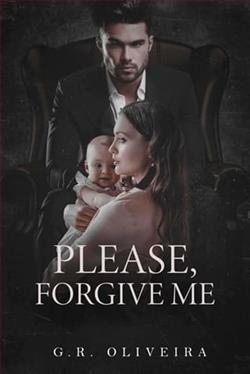Page 50 of The Quiet Tenant
Cecilia doesn’t care too much about your Thanksgiving plans. She tells you about the things she used to do with her mother at this time of the year. Her dad cooked most nights, but Thanksgiving—that was Mom’s thing, she says. There was a specific brine recipe, mashed potatoes with just a little bit of skin left in, toffee chip cookies they baked together and brought to their neighbors.
Her dad grinds his teeth through her reminiscing. There is a stiffness to him, a tension in his shoulders. He is a father. He is a single parent.
The night of, he tries. Sort of. He sets the table, proper napkins instead of the usual paper towels, tucked into turkey-shaped rings Cecilia stapled together a long time ago. Orange candles, golden paper plates with a red rim.
Instead of a turkey, he roasts a goose. A guy at work caught it himself, he says. Froze it and sold it to him a couple of days ago. Bile rises at the back of your throat. You poke at the flesh on your plate, white and patchy. You force yourself to chew and swallow, chew and swallow. It doesn’t come naturally to you, feeding on a creature captured in the woods and killed.
Carrots with rosemary. Fingerling potatoes. Cranberry sauce out of a can, just how Cecilia likes it. He is trying. This is his little girl, and he needs her to love him. He needs her obedient, blind, and adoring. He needs her to see everything he’s done to make her happy.
After dinner, there is a movie. Cecilia isn’t into holiday classics. Neither are you. No one’s in the mood for big happy families.
Cecilia flicks through suggestions. She settles on a Christmas rom-com. A young English actress plays a woman who has lost control of her life, stuck at a dead-end job, estranged from her sister. A new guy shows up, clearly an angel back from the dead to rescue her. He takes her on adventures around London, shows her all the quirky, charming things she’s missed out on.
“Has anyone ever told you,” the young English actress asks as she follows the angel down a dark alley, “that there’s something slightly serial killer-y about you?” The handsome angel tells her no, “never more than once, anyway.” The line gets a chuckle out of Cecilia. Her father doesn’t react. Maybe he didn’t even hear. Maybe he’s texting. You don’t know. You focus on the screen.
Your mind travels back to the first Thanksgiving after he took you. It was around then that you realized you were in this for the long haul. That your time in the shed would be counted in years, not months. You tried not to picture your family—your parents at the dinner table, keeping up appearances. Had your brother visited from Maine, or had he skipped the festivities altogether?
You used to be one part of a bigger whole. So often you held them together, your father, your mother, your brother. Lightening the mood after a fight, bringing home the good grades, the cheerful news, material for the family Christmas card. Did they go on without you? Or has your family split, bonds disintegrating as they often do after a terrible loss?
“Shit.”
He looks up from his phone. His eyes narrow.
“I have to run out for a second,” he says over the movie. “Stay here.”
Ostensibly, he’s telling Cecilia, but you know he means you. His phone buzzes. He looks down, then back up again. “I’ll be right back. I’m just picking something up.”
He types quickly, then sets the phone down on the armrest of his chair to push his feet into his boots. Cecilia pauses the film. “What’s going on?”
He gazes up, one boot on, the other in his hand. “Nothing. Just a friend who wants to give me something.”
His expression is the same as the night he brought you into thehouse, when his daughter’s voice chimed from the other end of the hallway. It’s so rare for you to see him like this. Caught off guard, scrambling to keep his two lives from crashing into each other.
“I’ll be right back.” He grabs his house keys. “I’m not going far.” Slowly, purposely, he adds for your benefit: “I’ll be just around the corner.” He points to some unknown location west of the house. “I’ll only be gone for a few minutes.”
Cecilia waves at him briefly, eager to start the movie again. You give her father a slight nod.
He leaps more than he walks to the door and, after one last look back at you, steps out. The lock clicks shut from outside, a useless precaution, keeping intruders at bay but not—you are acutely aware of this—barring anyone from leaving the house.
Your brain churns. Thoughts flutter around you like mosquitoes, whiny, too fast for you. You grab for them, try to bring them into focus one at a time.
He is gone. Not for long, he said, but he is gone. It’s just the two of you. You and Cecilia. You shift on the couch, a pressure weighing down your stomach, and that’s when you see it.
His phone.
He was in such a rush to get out, he left his phone on the armrest.
You look around. The key to his truck is hanging by the door. But what about him?
Where is he?
If you step out—if you make a run for it—will he see you?
Cecilia curls up against you. You fight to keep your focus. Your brain, wading through cornmeal, swimming through molasses. Can you leave her?
A fist tightens in your rib cage.
You stayed for her. The day he didn’t handcuff you properly. You told yourself you were staying because of the cameras. Because you weren’t sure. Because you were scared. But you could have been convinced. You could have found the courage.















